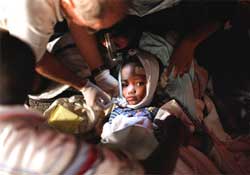Cuban Doctors were in Haiti before the quake
- Submitted by: admin
- Caribbean
- Havana
- History
- international
- personalities
- Science and Technology
- Society
- Health and Medicine
- Personalities
- Politics and Government
- 02 / 18 / 2010

When the devastating earthquake hit Port-au-Prince, Cuba's emergency responders didn't have far to travel. There were already some 350 Cuban medical personnel working in Haiti, sent by the Castro government to provide free care in nearly every
Haitian municipality.
Since then, the number of Cuban doctors, nurses and other medical workers deployed to the disaster area has risen to 618, and the Cuban brigade is working alongside 402 Haitian graduates of Havana's Latin American School of Medicine.
According to Cuban authorities, these teams have treated more than 60,000 patients and performed more than 3,500 surgeries. Their mission is driven by a simple principle, according to Fidel Castro.
"We are sending doctors, not soldiers," Castro wrote recently, taking a none-too-subtle swipe at the Obama administration's Haiti relief effort, in one of his regular postings on the government Web site Cubadebate.cu.
"In the midst of the Haitian tragedy," said the ex-Cuban leader, who has retired from his role as president but still weighs in on foreign affairs, "thousands of U.S.Marine Corps infantrymen, troops from the 82nd Airborne Division, and other
military forces have occupied Haitian territory. Even worse, neither the United Nations nor the U.S. government has offered an explanation to world public opinion for this mobilization of forces."
Despite Cuba's relatively small size and chronically ill economy, its education system has turned the island into a powerhouse of international medicine. Cuba sends thousands of doctors and other medical personnel abroad on "international missions," and brings planeloads of patients to Havana for free eye surgery or other procedures.
According to government figures, about 35,000 Cuban health care professionals are currently working in 70 countries. Some are assigned in the spirit of pure humanitarian assistance, while others are deployed through medical service contracts that bring in much-needed revenue for the Cuban government, as in the case of Venezuela.
These programs have generated vast amounts of international goodwill toward Cuba, building a kind of soft power that benefits the Castro government in its public relations battles with the United States.
Once an outcast in the region, the Cuban government has gradually restored diplomatic relations with nearly every country in the Americas (the U.S. being the main exception), despite the persistent image of Cuba's "isolation."
Then there are more than 24,000 foreign medical students enrolled at Havana's Latin American School of Medicine, mostly from Latin America, Africa and the Caribbean. The Cuban government provides full six-year scholarships, and the students commit to returning to their home countries upon graduation.
Cuba has even opened its classrooms to U.S. students from low-income families, and 130 Americans are currently studying medicine in Havana. Seven of the program's American graduates have joined the Cubans in Haiti.
"The world responds when there's a disaster, and responds generously, and that's wonderful," said Reed. "The point to me, however, is to build a strong public health system. And the fact that the Cubans have been in Haiti for more than 10 years
indicates a commitment to building a public health system."
The Cuban doctors provide everything from vaccinations to maternity care to major surgery, staffing Haiti's public hospitals and clinics.
For those efforts, Reed said, Cuba deserves recognition and praise.
Source: www.boiseweekly.com
Comments